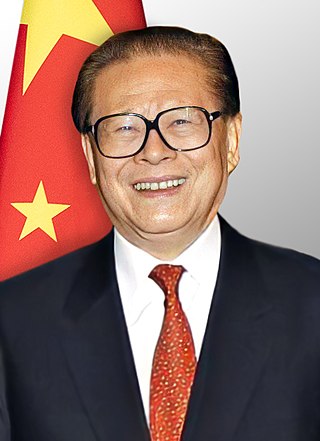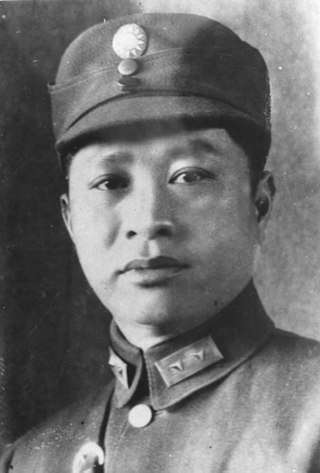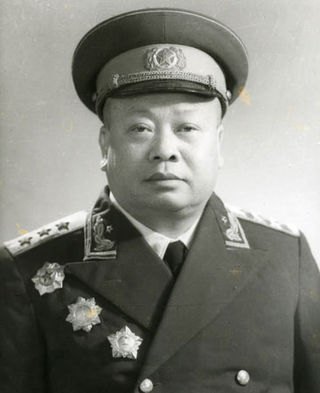
Jiang Zemin was a Chinese politician who served as general secretary of the Chinese Communist Party (CCP) from 1989 to 2002, as chairman of the Central Military Commission from 1989 to 2004, and as president of China from 1993 to 2003. Jiang was the third paramount leader of China from 1989 to 2002. He was the core leader of the third generation of Chinese leadership, one of four core leaders alongside Mao Zedong, Deng Xiaoping, and Xi Jinping.

Hu Jintao is a Chinese retired politician who served as the general secretary of the Chinese Communist Party (CCP) from 2002 to 2012, the president of China from 2003 to 2013, and chairman of the Central Military Commission (CMC) from 2004 to 2012. He was a member of the CCP Politburo Standing Committee, China's de facto top decision-making body, from 1992 to 2012. Hu was the fifth paramount leader of China from 2002 to 2012.
Wu Guanzheng, also spelled as Wu Kuan-cheng is a former Chinese politician and one of the major leaders of the Chinese Communist Party during the administration of Hu Jintao. He served on the Politburo Standing Committee, the country's top ruling body, from 2002 to 2007. During that time he also served as the Secretary of the Central Commission for Discipline Inspection of the Chinese Communist Party, the party's anti-graft body. He had a lengthy political career, having served as mayor of Wuhan, Governor then Party Secretary of Jiangxi, then party chief of Shandong. Wu retired in 2007 and left public life.
The Shanghai clique, also referred to as the Shanghai gang, Jiang clique, or Jiang faction, refers to an informal group of Chinese Communist Party (CCP) officials who rose to prominence under former CCP General Secretary Jiang Zemin while he served as the party chief and mayor of Shanghai.

Zhongnanhai is a compound that houses the offices of and serves as a residence for the leadership of the Chinese Communist Party (CCP) and the State Council. It was a former imperial garden, and is located adjacent to the Forbidden Palace in Beijing. The term Zhongnanhai is often used as a metonym for China's central government and its leadership at large.

Robert Lawrence Kuhn is a public intellectual, international corporate strategist and investment banker. He has been called “one of the Western world’s most prolific interpreters of Beijing’s policies.” Outside China Kuhn's work has largely been "panned" as "fawning work of hagiography", pro-China propaganda, or as spouting demonstrably untrue statements, whereas within China, Kuhn's books have reportedly achieved sales records only eclipsed by Harry Potter. Kuhn has a doctorate in neuroscience and is the author and editor of over 25 books. Kuhn is a recipient of the China Reform Friendship Medal, China's highest award; he is a long-time adviser to China's leaders and the Chinese government, to multinational corporations on China strategies and transactions, and is a frequent commentator on the politics, economics, business, finance, philosophy and science of China. Kuhn is a columnist for China Daily and South China Morning Post and appears on the BBC, CNN, China Central Television (CCTV), Bloomberg and other major media. Kuhn is the creator, writer and host of the show Closer to China with R.L. Kuhn and The Watcher and Xi's Deep Message commentaries. Kuhn is the creator, writer and host of the public television series Closer to Truth, which presents scientists and philosophers discussing fundamental issues. Kuhn's presentation, Asking Ultimate Questions, is the foundation of Closer To Truth.

Ye Ting, born in Huiyang, Guangdong, was a Chinese military leader who played a key role in the Northern Expedition to reunify China after the 1911 Revolution. After serving with the Kuomintang, Ye later joined the Chinese Communist Party (CCP).

Zhang Wentian was a Chinese politician who was a high-ranking leader of the Chinese Communist Party (CCP).

Project 985 was a higher education development and sponsorship scheme of the Chinese central government for creating world-class higher education institutions, initiated in May 1998. There were 39 universities selected to be part of this program.
The 8th National People's Congress was in session from 1993 to 1998. It succeeded the 7th National People's Congress. It held five sessions in this period.
The politics of Zhejiang Province in the People's Republic of China is structured in a dual party-government system like all other governing institutions in mainland China.
Yangzhou High School of Jiangsu Province is a high school in Yangzhou, Jiangsu, China. It grew out of Yidong School, which was established in 1902.

The National Security Commission is a commission of the Central Committee of the Chinese Communist Party (CCP) responsible for national security work and coordination.

The Four Comprehensives, or the Four-pronged Comprehensive Strategy is a list of political goals for China, put forward by Xi Jinping, General Secretary of the Chinese Communist Party (CCP) in 2014. They are:
- Comprehensively build a moderately prosperous society
- Comprehensively deepen reform
- Comprehensively govern the nation according to law
- Comprehensively strictly govern the Party.
Jiang Zelin is a Chinese politician, serving since 2015 as the Deputy Secretary-General of the State Council and chief of staff to Vice Premier Wang Yang. He previously held office as Communist Party Secretary of Sanya, vice governor of Hainan province, and executive vice governor of Shaanxi province.

Lai Chuanzhu (simplified Chinese: 赖传珠; traditional Chinese: 賴傳珠; pinyin: Lài Chuánzhū; 3 April 1910 – 24 December 1965) or Peng Ying (鹏英) was a general of the People's Liberation Army from Gan County, Jiangxi.

Moha, literally "admiring toad" or "toad worship", is an internet meme spoofing Jiang Zemin, former General Secretary of the Chinese Communist Party and paramount leader. It originated among the netizens in mainland China and has become a subculture on the Chinese internet. According to another explanation, it comes from China's social media Baidu Tieba. In the culture, Jiang is nicknamed há, or "toad", because of his supposed resemblance to a toad. Netizens who móhá call themselves "toad fans", "toad lovers" or "toad worshippers", or "mogicians" which is a wordplay on mófǎshī in Mandarin.

The 50th anniversary of the founding of the People's Republic of China took place on 1 October 1999. A military parade was held in Tiananmen Square in Beijing and various celebrations were conducted all over the country. China's paramount leader Jiang Zemin inspected the troops along Chang'an Avenue in Beijing. This parade was immediately followed by a civilian parade.

Jiang Zemin, the general secretary of the Chinese Communist Party (CCP) from 1989 to 2002, and the president of the People's Republic of China from 1993 to 2003, died on 30 November 2022, at the age of 96, in Shanghai. According to Xinhua News Agency, he died at 12:13 local time, from leukemia and multiple organ failures. Following a private funeral at PLA General Hospital and cremation at Babaoshan Revolutionary Cemetery, a state funeral for Jiang was held at the Great Hall of the People the next day on 6 December 2022. It was the first major state funeral held in China since 1997 when Deng Xiaoping died.
The 40th anniversary of the founding of the People's Republic of China took place on 1 October 1989. The event was held at the Great Hall of the People and Tiananmen Square in Beijing, More than 10,000 party and state leaders and people from all professions in the capital attended the event. Due to the 1989 Tiananmen Square protests and massacre that year, the planned National Day military parade was cancelled.













